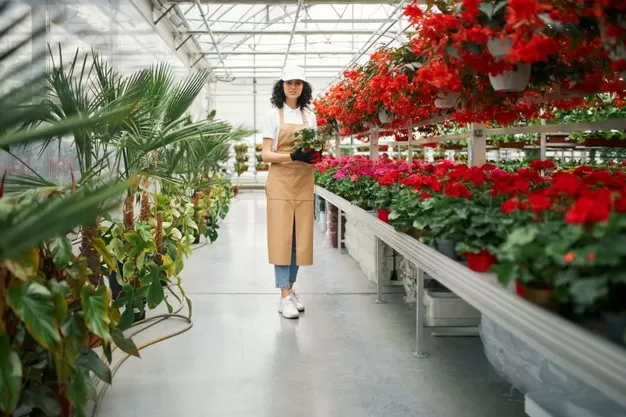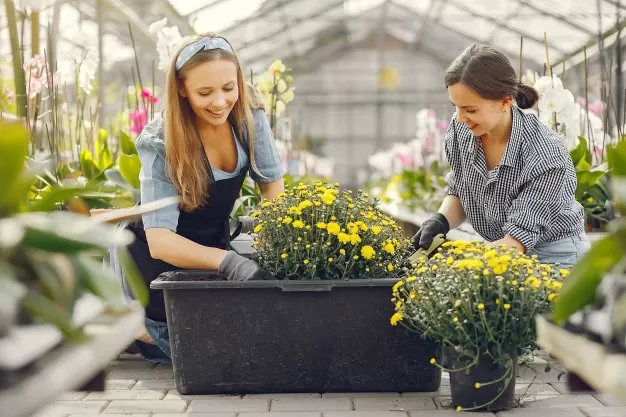The world of organic gardening is very vast and exciting. There are so many ways to enter and use their knowledge of this field to help themselves grow healthier “green” plants. It depends entirely on your skills and environment. No matter your organic gardening skills, here are some tips to help you along.
Use companion plants. Companion planting is pairing plants within your vegetable garden, such as planting cabbage with tomatoes. Companion planting helps reduce the problems with insect pests, as it attracts natural pest-controlling wildlife. Companion planting is also a better use of the space in your garden since you have two plants in the same plot.
When starting your organic garden, you must ensure you have the proper containers because containers are crucial for holding your plants. Your containers should be around two or three inches in depth to be effective. In addition, you should make sure you have holes in the bottom of your containers for drainage purposes.
Make easy work of washing your organic produce with a laundry basket. As you pick your produce, lay them in a plastic laundry basket, which works as a filter. Hold the hose over the top, and the water can make quick work of rinsing all the dirt and other matter off your fruits and veggies.
If you have a compost pile but have very few leaves to add to it this fall, try incorporating straw or hay into your compost pile. This is a great way to add carbon which is very beneficial to the growth and health of plants. The straw and hay may contain seeds, so it is best to use an organic weed spray on your compost pile to get rid of the unwanted weeds.
Utilize frost covers for your plants when it gets cold. Frost may cause tiny ice crystals to form in your plant and shred the natural, soft flesh of the plant. Milk jug containers and other plastics can help you make a closed environment around your plant. Ideally, you want to protect your plant from being exposed to the cold outside air.
To offer your organic gardening the most success, mulch it with 3 inches of organic material. By mulching your organic garden, you will conserve water, add nutrients to the soil and stop weeds from growing. As a bonus, mulching also gives your organic garden a bit of beauty.
For the best organic garden, choose plants that do best in your type of soil and climate. Plants who have adapted to a specific environment have a better chance of thriving without much fuss in that environment. These plants will also save you time in maintenance because they are naturally hardy.
A natural, albeit somewhat tedious, way to keep pests and fungus from destroying your organic fruit crop is to use plastic zipper bags. When the fruits are still young on the branches, please place them in large zipper bags secured at the top with staples. Cut off a bottom corner to allow for adequate drainage.
Fill your gardens with flowers. It would be best if you didn’t spend too much time and energy planting annual types of flowers as they will only last one season. Keep these types in a limited area of your garden. For larger areas, go with perennials. That way you will have flowers again next year.
Hand weed your organic garden regularly. Get on your knees, put your hands in the dirt, and pull weeds out by their roots. If you do this regularly, you can avoid using harmful pesticides. Your garden will stay healthy, safe, and organic.
When starting an organic garden, look into natural pesticides. It is a healthy way to ensure you do not lose plenty of your crops to insects while working to keep your environment safe. Many pesticides were once used and are effective.
When you are ready to mulch, choose an organic mulch. Cocoa hulls or weed-free straws are great examples. The mulch will eventually decompose and add rich, organic nutrients to your soil. Just add a couple of inches to your garden each year, and you will see the long-term benefits.
To prepare the ground for your perennial organic plants, cut the turf and turn it over a few weeks before planting time. Spread wood chips a few inches deep on the freshly-turned soil, and within a couple of weeks, the ground will be ideal for your organic perennials. These hardy plants need only a little bit of preparation.
Get to know the local weather patterns in your geographic region. When you know your climate and how it influences the growth of your garden, you can predict how your garden will grow. You can make your garden more productive by monitoring local weather forecasts and planning your gardening activities accordingly.
Rich, organic compost can significantly enhance the quality of your garden and potting soil by introducing beneficial new elements and organisms into the environment. These helpful guests include bacteria, soil-enriching earthworms, and a variety of insects that can consume and devour more harmful organisms that have invaded the soil.
It may seem tempting to want to use chemicals in your organic garden, but these will do more harm than good, defeating the purpose of an “organic” garden. If you think about it, all of these types of pollutants run off and contaminate whatever they touch. You won’t need any chemical fertilizers anyway by keeping your soil healthy.
Mulch is quite a welcome addition to any organic garden, but there can be too much of a good thing. A tree with too much mulch on its trunk can quickly become diseased or infested. Do not pile it against their trunks and instead spread it as far as the drip line.
Organic gardening is a fascinating world that is only limited by your knowledge and environment. There are endless products and techniques you can use for your organic garden. Start experimenting to find something new to use in your organic garden or improve upon a technique. Use these tips to grow!



